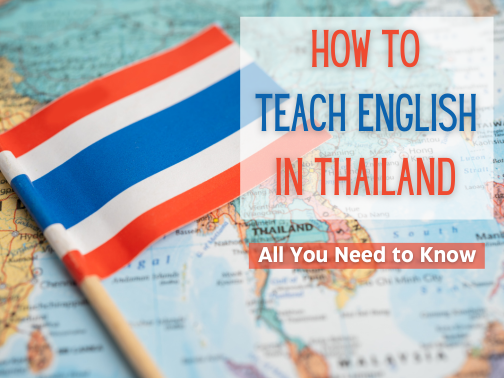Contents
Toggle
Meet David De’ Ath, founder, editor, and writer at Wonderful World English. With his extensive background as an English teacher, David provides valuable insights and practical tips on ESL for students and teachers alike.
Thailand is one of the most visited countries on Earth.
And no wonder why!
This Southeast Asian country is famous for its incredible landscapes, vibrant culture, delicious cuisine, warm hospitality, and so much more!
Though most of the travelers to this land are there temporarily, some call Thailand their permanent home.
Many of these ex-pats teach English as a Second Language (ESL) in Thailand.
Teaching ESL in Thailand can provide a unique opportunity for people to immerse themselves in a culturally rich environment that allows them to explore parts of Asia that they would otherwise only be able to dream of.
If you are passionate about education and adventure, Thailand could be your place!
To teach English in Thailand, teachers must possess the necessary qualifications. Thai schools typically require at least a bachelor’s degree in any subject and a relevant teaching qualification, such as a TEFL certificate. A criminal background check may also be necessary from your home country to apply for a work visa.
I am an experienced ESL teacher, and I’ve been living in Asia for several years.
I know several others currently living and working in Thailand, and I aim to give you insights into what it takes to teach English in this beautiful country.
We will explore what is required to teach in Thailand and some other helpful information about teaching English there.
Backpacks at the ready. Let’s jump in!

How to Teach English in Thailand
English proficiency goes hand in hand with economic growth around the world.
Thailand, along with many other countries, understands this, so they put a lot of emphasis on their people learning English.
Thailand’s bustling tourism industry and international business connections greatly benefit from having people who can articulate themselves in English.
This means that ESL jobs are not hard to come by in Thailand.
However, Thailand’s global popularity makes the competition for ESL jobs relatively high.
Let’s explore the requirements for anyone wanting to teach English in Thailand:
1. The Thai Education System
For anyone wanting to teach English in Thailand, it’s a good idea first to understand the Thai education system.
The education system in Thailand includes government, private and international schools (which are also private). The system, and many of its schools, are split into 3 distinct stages, covering pre-school, primary and secondary education.
Bangkok Prep School
On top of the three stages mentioned above, we will include higher education.
So these are the four main stages of the Thai education system that ESL teachers may be involved with:
Pre-school (Students aged 2 to 6)

The first level of education in Thailand for many children is pre-school.
These schools are commonly known as “Anuban” schools.
Anuban means “nursery” or “early childhood” in Thai.
This is essentially Kindergarten level and is not compulsory for students to attend, but it is encouraged.
Parents may wish their children to attend preschool for a head start before primary education.
Thailand’s preschool follows a play-based system that promotes child development, socialization, and early learning skills.
Activities may include singing, dancing, arts and crafts, and storytelling.
This can be an excellent option for anyone with lots of energy who loves working with young children in a less serious classroom environment.
Primary Education (Students aged 6 to 11)

In Thailand, children are required to attend school from the age of six.
Primary schools in Thailand are commonly referred to as “Prathom” schools.
Prathom translates to “primary” in English.
The curriculum for primary education in Thailand covers all the major subjects, such as language, maths, science, art, and physical education.
A typical Thai school will start at 8 a.m. and finish around 4 p.m.
Any ESL teacher working at a primary school in Thailand will have students of varying levels of English proficiency.
Teachers must be adaptable, patient, and able to manage a classroom.
Secondary Education (Students aged 12 to 18)

After completing their primary education, students will move on to secondary education at age 12.
Secondary schools in Thailand are known as “Mathayom” schools.
The term Mathayom translates to “secondary” in English.
Secondary education in Thailand expands upon the foundations students learn in their primary education.
English is also a compulsory subject at this level, and some schools may offer additional foreign languages, such as Mandarin or Japanese.
Like primary schools, secondary schools will operate on a full-day schedule, starting in the morning and ending in the afternoon.
Thai secondary schools are overseen by the Office of the Basic Education Commission (OBEC) under the Ministry of Education.
Higher Education

Higher education in Thailand is provided by institutions such as universities and colleges.
Thailand has a well-developed university system that offers a wide range of programs.
Many Thai universities offer international programs that are taught in English to attract international students.
These programs can range from a bachelor’s level up to doctoral degrees.
The Office for National Education Standards and Quality Assessment (ONESQA) is responsible for ensuring the quality of higher education in Thailand.

2. Qualifications
To teach English in Thailand, most institutions require teachers to hold at least a bachelor’s degree in any subject.
A degree will significantly enhance one’s chances of finding a teaching position in Thailand.
Even though a degree in any field is acceptable, a degree in English or education is considered the cream of the crop.
On top of holding a degree, prospective teachers must also have a relevant teaching qualification, such as a Teaching English as a Foreign Language (TEFL) certificate.
Any reputable schools and language institutions will undoubtedly require this.
Check out the link below to find out more about TEFL certificates.
Related Article: Is TEFL Worth It? The Pros and Cons of TEFL Certificates

3. English Proficiency
To be eligible for ESL positions in Thailand, you should be a native speaker or have a high level of English fluency.
The most desired candidates for teaching positions will be from native-English-speaking countries such as the U.S., U.K., Australia, Canada, and New Zealand.
Some schools will require teachers to hold a passport from one of these countries to be considered for employment.
If a native passport isn’t required, a non-native English speaker may be required to prove they have the relevant language proficiency qualifications to show they have a firm understanding of the language.
Did you know that Thailand has one of the highest levels of English proficiency in Asia?
Find out what Asian countries can speak English in the guide below!
Related Article: What Asian Countries Speak English? – Full Guide

4. Work Permit & Visa

Teachers will require a work permit to live and work in Thailand legally.
If you want to move to Thailand and work, you need to apply for a Thai work visa in your country from an Embassy or Consulate. However, regardless of the work visa, to legally work and live in Thailand, you must obtain a work permit and an extension of your stay.
Visaguide.world
Fortunately, schools typically assist teachers with the paperwork and will guide them through the process.
So, it’s best to reach out to potential employers first and foremost and inquire how they can assist you in obtaining a work permit.
Another part of the application process means that teachers may be required to provide a criminal background check from their home country.
This is to help ensure the safety of students and is a common requirement for working in educational institutions in Thailand.
Click here to find out how you can apply for a Thai work visa.
5. Teaching Opportunities
There is a wide range of teaching opportunities that are available in Thailand.
These include public and private institutions.
From bustling cities like Bangkok to the more relaxed rural life, with the right approach, ESL teachers can find the right position to suit their wants.
Considering your preferences before making big decisions is a good idea.
Anyone looking to teach in Thailand who has the right qualifications (and even better if they’re experienced) can look for potential positions on job sites and forums.
LinkedIn is a great place to network with other teachers and people in the ESL industry.
If you’re reading this, you may be considering a career in ESL.
Check out the article below for why teaching English as a second language can be an excellent career choice!
Related Article: Why Become an ESL Teacher? – Teacher’s Top Reasons

Finding a Teaching Position in Thailand
So, if you’re sure you fit the right criteria and you’ve decided that you want to teach in Thailand, it’s time to find a teaching position!
Researching and choosing a reputable institution is highly recommended for a successful experience teaching in Thailand.
Looking for programs that provide enough support, resources, and growth opportunities would be best.
It’s also advisable to check out reviews on platforms like Trustpilot, for example, and to connect with current or former teachers to gain valuable insights into their personal experiences.
Let’s look at the largest employers of English teachers in Thailand and how you can go about reaching out to them:
1. Language Schools
Language schools are privately owned and tend to offer the highest salaries for beginner ESL teachers in Thailand.
Teachers usually get paid 15,000-25,000 baht a month ($450-$760) more than at a government school.
That’s a big difference!
Language schools tend to have better facilities and materials for their students, which can significantly enhance the learning process for everyone.
Conversely, language schools can be less stable than government schools, and younger students may be less eager to learn than in public schools.
Either way, a language school can be a great foot in the door to the world of teaching ESL.
If you’re seeking a language school position in Thailand, check out online job portal sites like Dave’s ESL Cafe and Tes.com.
Reaching out to recruiters and contacting language schools directly can be a great way to get the ball rolling, and it doesn’t take much of a Google search to start seeing job listings for schools all over Thailand.

2. Public Schools
When people first start looking for teaching positions in Thailand, one of the most important choices they may have will be whether to work for a government school or a private one.
Government schools tend to pay less than private institutions, but they are typically much more stable positions.
Teachers are often left to their own devices in these kinds of environments.
Government schools tend to have a more stable curriculum, without the constant ‘let’s try this’ of some of the private schools so, if you can get a job at a government school, you’ll likely be able to stay as long as you want.
Tastythailand.com
Despite this, government schools can be a bit stricter than private ones.
So, if you’re looking for a more stable position and don’t mind earning a bit less, a government school could be a great choice!
If you’re interested in finding more about government school positions in Thailand, check out job listings online.
Or you can contact the Ministry of Education for assistance finding a teaching position in Thailand.

3. International Schools
This option will suit teachers with experience and higher qualifications.
If you have previous experience teaching ESL and meet the right criteria, an international school could be a great option.
These schools tend to receive a large number of applicants, so it can be pretty challenging to be offered a position, especially for new teachers.
There are many international schools around Thailand, so applicants should tailor their approach and do their research before applying for any particular school.
This will go a long way in making a good impression and making the interviewing process smoother.
Sites like Ajarn.com can be a great place to start looking for these positions.

Tips for Teaching English in Thailand
Before embarking on a trip to teach in Thailand, there are a few essential things to consider.
As with moving to any foreign land, it will come with its own set of challenges.
Below are some valuable tips on how to make teaching in Thailand a more enjoyable experience:
1. Consider the Culture
Thailand is a country that is rich in traditions and customs.
Ex-pats need to familiarize themselves with these aspects to avoid offending anyone.
Some religious areas have a particular dress code, for example.
The Wai greeting is an excellent example of a Thai custom that ex-pats should be familiar with.
Understanding and respecting Thai customs will significantly help teachers develop stronger relationships with their students and colleagues.
Remember to embrace the local culture and be open to learning from your Thai peers.
Check out the video below for some great insights on teaching English in Thailand!
2. Language Barriers
Language barriers will work both ways, whether it’s students not understanding the content or the teacher not understanding the local language.
Many ESL teachers around the world have encountered this obstacle, and many have overcome it.
Employing effective communication strategies such as using proper Total Physical Response (TPR) when teaching, using visual aids, and keeping the language simple is a great start.
Many schools also offer their teachers the chance to study Thai as part of the package, so if you’re looking to learn a new language, this could be a great option.

3. Lesson Planning and Classroom Management
Any good ESL teacher will attest to the importance of proper planning and classroom management.
Including various activities, such as games, presentations, group work, etc., are all great ways to keep lessons fun and engaging.
Setting clear expectations and maintaining control is crucial to creating a positive classroom culture.
For some inspiration on the best games and activities you can play in a classroom, check out the guide below!
Related Article: Fun Classroom Games to Play – Teacher’s Guide

Teaching English in Thailand has changed the lives of many ESL teachers over the years.
Fortunately, ESL is still in growing demand, and Thai schools are looking for great new additions to their team.
Living in Thailand will allow teachers to explore the country’s breathtaking landscapes, beautiful temples, and colorful markets in their free time.
Thai cuisine is among the most popular in the world, and Thai people are renowned for their friendly personalities.
And let’s not forget about the fantastic weather, luscious rainforests, and golden beaches peppered all over Thailand!
Although Thailand doesn’t typically pay the highest salaries for ESL teachers, it boasts one of the most beautiful natural landscapes and many opportunities to travel and explore.
ESL teachers in Thailand often love what they do and have no intention of going anywhere else anytime soon!

Conclusion
In conclusion, teaching English in Thailand can offer remarkable opportunities to combine a passion for education with rich cultural experiences.
It’s essential for anyone wanting to work in Thailand to obtain the proper qualifications before applying for work.
Once they have found a position, the institution will typically aid teachers in applying for work visas.
Living in Thailand can be an incredible experience, and ESL teachers get to boast about living in a gorgeous place while positively impacting the lives of their students.
If you’re looking for an ESL position in Thailand, you should check out updated job listings online and start reaching out to schools and recruiters!
We hope this has helped you better understand what it takes to teach English in Thailand!
Image Attribution: All images licensed via canva.com





